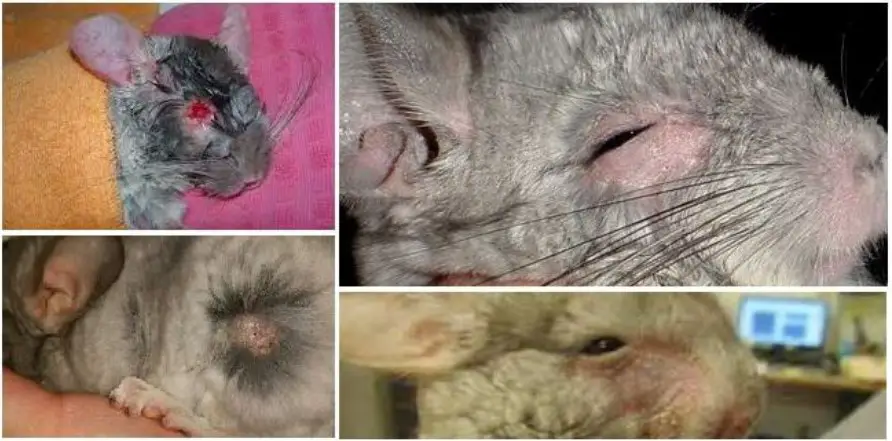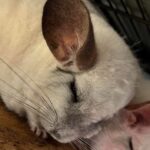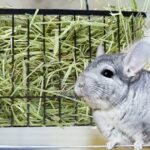Common Health Problems in Chinchillas: Chinchillas can suffer due to various types of health-related disorders. Knowledge of such health problems is vital for better care management of Chinchillas. Chinchillas are highly susceptible to different diseases and disorders, which can be cured with timely actions. With proper care and precautionary measures, you can even avoid these diseases also.

Chinchilla can be allergic to allergens, suffer bacterial and fungal infections. Parasites quickly attack them like fleas and ticks. They are highly sensitive to any change in their environment and may fall sick due to stress. Also, mobility problems like arthritis or paralysis are found in Chinchilla pets. Improper diet can cause dental issues, which can further lead to eye problems. Let us have a look at the most common health problems in Chinchillas.
List of Most Common Health Problems in Chinchillas
These are the most common issues that may come up if you own chinchillas:
#1 Eye infections:
A quick trip to the vet is in order if your chinchilla has discharge from their eye or if you notice they have a sealed eye. Eye drops are usually prescribed and their eye will clear up soon
#2 Dry Ears or Feet:
Sometimes chins get too dry feet or ears. You can apply Bag Balm to help with that.
#3 Fungus
Fungus is something that occurs from time to time. For minor bouts of fungus you can apply Blu Kote or Blue Lotion and have the chinchilla have a dust bath with tinactin added to the bath (2tbsp of tinactin to 2 cups of dust). Chinchillas are no different when it comes to fungal infections. They are also prone to such attacks. As we all know, the fungus develops in a dark and humid place. So, if your Chinchilla is exposed to such conditions, it is likely to be infected by fungus.
#4 Ringworm
Chinchillas also commonly infected with ringworm. They show red circles on the skin, which can be transferred to other Chinchillas. Sometimes you will observe a thick crust of fungus on the surface. Topical treatments are available in the stores for fungal infections. If the problem persists or occurs again, look for the possible cause of fungal infection. Disinfect the cage and other toys regularly.
#5 Squishy Poop
Squishy Poop can happen for a variety of reason. If the poop does not clear up within a few days get to a vet for fecal test for parasites. You can offer a chin burnt toast, shredded wheat, activated charcoal in the water or pet pectillan to firm up their poops. It can be from too many treats, to a feed change, stress or you may never know what caused it. Once you have ruled out a parasite it should clear up quickly. Some people remove pellets and feed only hay for a few days.
#6 Small Injuries
Small injuries can occur and if it is minor you can treat with Blu Kote (blue lotion). Also, Chinchillas are highly vulnerable to physical injuries and trauma. That may damage the bones. They react abruptly when frightened and can even jump from a height. That can render their frail body injured. Sometimes Chinchillas also may be afraid of their owner and get themselves injured. You should be able to manage such injuries. Try to gain their confidence so that they do not jump out of your arms. Keep a close watch when the pet is playing with your child. A Chinchilla pet may not enjoy playing along with your child. Check whether your child can carry the Chinchilla comfortably or not. Chinchillas have in their instinct to be curious and explore different places. So keep things away from the pet, which can harm it. Often while jumping from one place to another, they might fall and get injured if the foot is not placed correctly. If a Chinchilla breaks its limb, then it is hard to recover. Few may recover depending upon the severity, while others may not. Their limbs may be amputated in severe cases.
#7 Fur Biting:
A chinchilla with fur biting has been a behavioral problem, on its flank. The inset shows fur slip, a protective reaction that results in the release of a large patch of fur revealing smooth, clean skin underneath.
#8 Bumblefoot
Bumblefoot is a where the natural calluses on your chinchilla’s feet become too thick. Fluid develops underneath them and can rupture the skin, or the skin can crack when dry. If the wound becomes infected, it becomes a painful open abscess. This stops your chinchilla walking. The infection can spread, and can kill, so take your chinchilla to the vet.
#9 Mental health
Chinchillas mental health also affects when they are unhappy, mostly when they are leaving alone. When they feel bored they chew their fur. It is one of the symptoms to identify the mental conditions of Chinchillas. However, fur-chewing itself is a benign symptom that does not cause physiological distress.
Real Life Example: (Chinchilla Lost Its Tooth):
When you have a Chin who is sick, injured, or undergoing dental problems you’ll often have to step in and hand feed them. A chinchilla named Chibi is missing a tooth and is having a hard time eating enough on her own, so we are supplementing her diet with a mixture of Oxbow Critical Care, Sherwood’s SARx mix, and about a tsp of raw honey, all mixed up with hot water to make a loose apple sauce consistency. We choose to add a small amount of honey to add extra sugar into the mix. This is a personal choice, and it just helps encourage them to eat and keep their blood sugar up. When chins are in really poor shape they need to be forced about 3x a day, 20-30ml feedings. Thankfully, Chibi is happy to have help getting a warm meal in.
Common Health Problems in Chinchillas:
| Health Issue | Symptoms or Causes | Suggested Action |
|---|---|---|
| Diarrhea | Loose stool caused by a low-fiber/high-carbohydrate diet, stress, gastrointestinal parasites, unclean housing or other illness. | Consult your veterinarian to determine cause and treatment. |
| Eye irritation/ discharge | From dust, bed shavings or infection. | Consult your veterinarian. |
| Heat stroke | An emergency condition. symptoms include heavy panting, collapse, seizures, loss of consciousness. | Can be fatal; consult your veterinarian immediately. |
| Malocclusion | Overgrown teeth; salivation; wetness on chin. | Consult your veterinarian to possibly have teeth trimmed regularly. |
| Mites | Patchy hair loss; itchy skin. | Consult your veterinarian for treatment. |
| Ringworm | Patchy hair loss; excessively dry and flaky skin Caused by skin infection with fungus. | Consult your veterinarian for treatment. |






